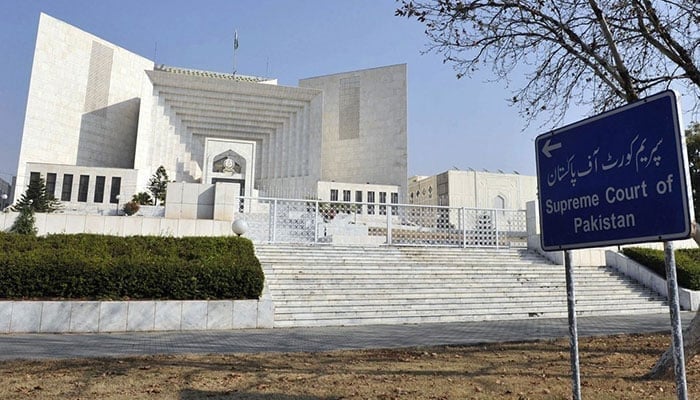The constitutional bench of the Supreme Court recently heard several important cases, addressing issues ranging from the private use of the Islamabad Convention Centre to the recovery of embezzled funds and the authority of the Federal Ombudsperson.
### Islamabad Convention Centre
The bench first took up the case regarding the private use of the Islamabad Convention Centre. During the proceedings, the bench sought a response from the Attorney General’s office. Justice Mazhar pointed out that a notice had also been issued to a former prime minister as part of this suo motu case. Justice Mandokhail directed that the convention centre be managed in accordance with the institution’s established policy.
The additional attorney general requested time to gather details about outstanding dues, which Justice Aminuddin granted, instructing him to update the court. The hearing was subsequently adjourned.
### Recovery of Embezzled Funds
In a related case concerning undisclosed foreign bank accounts and the recovery of embezzled funds, Advocate Hafiz Ahsan informed the bench that amendments had been made to income tax law, and proceedings were ongoing to uncover and recover the funds through the legal process.
Justice Mazhar noted that orders had been issued for reports from relevant agencies, including the FIA and FBR. The FBR’s counsel argued that this case primarily involved the FBR and FIA, with no other agencies involved. Justice Mazhar emphasized that if any efforts to close the case were underway, a report should be submitted. The court instructed both the FIA and FBR to submit updates on the status of undisclosed foreign bank accounts and recovery efforts. The hearing was adjourned for two weeks.
### Contempt of Court Case Against Former Ombudsperson
In another case involving the Federal Ombudsperson, the bench granted additional time for the counsel representing the ombudsperson to submit a response. Justice Aminuddin noted that former federal ombudsperson Yasmin Abbasi had failed to appear in court, even though she had previously attended hearings. Justice Jamal Mandokhail questioned why the court should continue to focus on a former official, while Justice Hilali raised concerns about whether the ombudsperson’s actions could be challenged in the high court.
Justice Mazhar explained that the case remained unresolved, highlighting that the Lahore High Court had issued arrest warrants for a judge involved in the case. He directed that Abbasi be notified about the proceedings, emphasizing that continuing the case despite a high court stay order could constitute contempt of court.
The bench ordered that a notice be issued to the current Federal Ombudsperson to clarify whether they wished to continue with the case or withdraw it. The hearing was adjourned with instructions for the counsel to submit a response.
### Question of Authority in Anti-Terrorism Case
During the hearing of a suo motu case related to anti-terrorism, lawyer Munir Paracha argued that further proceedings were unnecessary, citing the 26th Constitutional Amendment, which he claimed limited the Supreme Court’s authority to take suo motu notices.
Justice Mazhar clarified that while the procedure had changed after the amendment, the Supreme Court still retained the power to take suo motu notice. He explained that such notices would now be handled by a constitutional bench. Justice Mandokhail added that the issue would be addressed in future cases if necessary. The court disposed of the case, noting that the matter had been resolved.
### IT University Issue
In the case regarding the establishment of an IT university in Islamabad, CDA lawyer Munir Paracha argued that land for educational purposes could only be allotted with federal cabinet approval. He suggested that land in Sector I-17 could be provided once the necessary approval was obtained. Justice Hilali expressed suspicion about the intentions behind the land allocation, while Justice Mandokhail proposed referring the matter to the Special Investment Facilitation Council (SIFC).
The petitioner’s lawyer, Salman Butt, argued that foreign investors were often invited to invest only to be turned away later, leading to a loss of trust. The court instructed the parties to resolve the matter amicably and adjourned the hearing for 10 days, with Justice Hilali urging efforts to ensure the university’s establishment for the benefit of education.
### Lady Health Workers’ Regularisation
The bench also heard petitions filed by lady health workers seeking regularisation by the Sindh government. The Advocate General of Sindh appeared via video link, explaining that regularisation had been carried out in line with court orders. Justice Mazhar questioned why regularisation was not considered a matter of fundamental rights and asked the advocate general to clarify the structure established for the lady health workers, ensuring that they received all the service benefits.
The court noted that the petitioner’s lawyer and Advocate on Record (AOR) were absent, and ordered that notices be issued to them. The case was adjourned indefinitely for further hearings.
### Judicial Employees’ Appeal Rights
Finally, the bench took up a case related to granting appeal rights to judicial employees. Justice Mandokhail noted that it was the responsibility of the relevant high courts to formulate rules in such cases and emphasized that a petition could not be filed under Article 199, Sub-section 5. The court issued notices to the relevant parties and adjourned the hearing for further consideration.
This series of hearings demonstrated the Supreme Court’s ongoing efforts to address a wide range of legal and administrative issues, from the management of state institutions to ensuring the rights of workers and the integrity of judicial processes.



